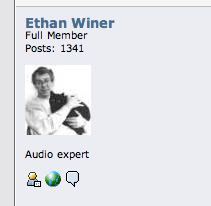From the other thread (some people just continue to post there?)
This thread is an opportunity for Ethan to clarify & now it seems correct his "criteria for audio transparency". I believe he should be thanking us for refining his criteria & questioning it's substance - it's how science is made more robust. I do agree with measurements being used to qualify & quantify devices, once those measurements are based on some evidence I find amir's posts regarding speaker measurements done by Harmon & those measurements mapping directly to the blind listening tests of those speakers to be compelling. I don't find Ethan's measurements or statements anywhere nearly as compelling.
My testing of pre-echo audibility I found interesting & decided to post it on the 24/192 thread as an example of what might be one of the issues why high-res samplerates might sound better. I remarked that this pre-echo also contradicted Ethan's criteria for audible transparency.
So far he has not successfully demonstrated that this is an incorrect statement.
Can't say I care for that thread. It strikes me as a thinly-veiled attack on Ethan. I understand that Ethan is a bit black and white in his views, that he doesn't mince words, that he can be rather demanding of those who attempt to attack his point of view without a well-formed and supported one of their own. I'm sure it's irritating; enough to make you just wait for him to make a mistake. But if you came to the discussion with a bit more substance, you wouldn't need to start threads to dance in a circle with glee when his noisefloor is off by a bit. You might actually have a viable position of your own. You might even find yourself occasionally agreeing with Ethan.
Tim
This thread is an opportunity for Ethan to clarify & now it seems correct his "criteria for audio transparency". I believe he should be thanking us for refining his criteria & questioning it's substance - it's how science is made more robust. I do agree with measurements being used to qualify & quantify devices, once those measurements are based on some evidence I find amir's posts regarding speaker measurements done by Harmon & those measurements mapping directly to the blind listening tests of those speakers to be compelling. I don't find Ethan's measurements or statements anywhere nearly as compelling.
My testing of pre-echo audibility I found interesting & decided to post it on the 24/192 thread as an example of what might be one of the issues why high-res samplerates might sound better. I remarked that this pre-echo also contradicted Ethan's criteria for audible transparency.
So far he has not successfully demonstrated that this is an incorrect statement.








